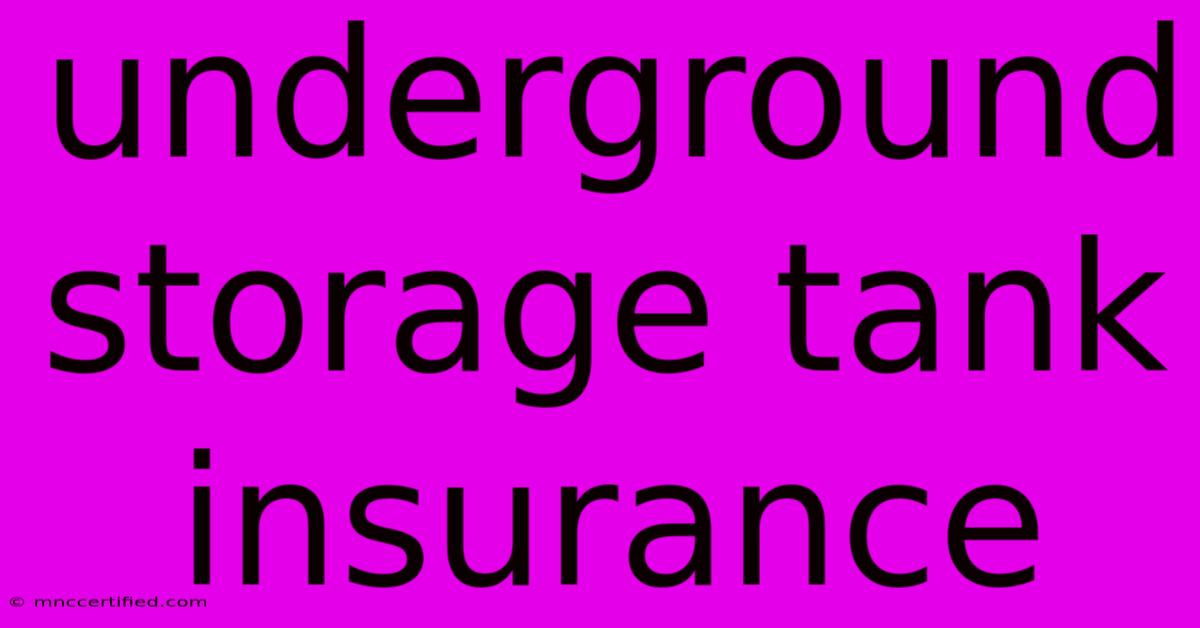Underground Storage Tank Insurance

Table of Contents
Underground Storage Tank (UST) Insurance: Protecting Your Business from Environmental Catastrophes
Underground storage tanks (USTs) are crucial for many businesses, from gas stations to industrial facilities. However, they also pose significant environmental risks. Leaks can contaminate soil and groundwater, leading to expensive cleanup costs and hefty fines. This is where underground storage tank insurance becomes absolutely vital. This comprehensive guide will explore the nuances of UST insurance, helping you understand its importance and how to secure the right coverage.
Why You Need Underground Storage Tank Insurance
The potential liabilities associated with USTs are substantial. A single leak can trigger:
- Environmental remediation costs: Cleaning up contaminated soil and groundwater is an incredibly expensive process, often running into hundreds of thousands, or even millions, of dollars.
- Government fines and penalties: Regulatory bodies like the EPA impose significant penalties for non-compliance and environmental damage.
- Third-party liability claims: If your UST leak contaminates neighboring properties, you could face lawsuits demanding compensation for damages.
- Business interruption: The cleanup process can force temporary closure, leading to lost revenue and potential business failure.
Without adequate insurance, you are solely responsible for bearing these potentially crippling costs. Underground storage tank insurance acts as a financial safety net, protecting your business from devastating financial consequences.
Types of Underground Storage Tank Insurance Coverage
Several types of insurance policies can address the risks associated with USTs:
1. Pollution Liability Insurance:
This is the cornerstone of UST insurance. It covers cleanup costs and third-party liability claims resulting from pollution caused by a UST leak. Pollution liability insurance is crucial for mitigating the financial burden of environmental damage. Make sure to understand the policy's limits and exclusions carefully.
2. Pollution Legal Liability Insurance:
This coverage helps pay for legal defense costs associated with pollution lawsuits. Environmental litigation can be protracted and expensive, making this a valuable addition to your protection strategy.
3. Property Damage Insurance:
While not strictly UST-specific, comprehensive property insurance can cover damage to your own property caused by a UST leak, such as damage to the tank itself or the surrounding soil.
4. Business Interruption Insurance:
This insurance covers lost income and ongoing expenses during the period your business is forced to shut down due to a UST leak and the subsequent cleanup. It helps maintain financial stability while addressing the environmental issue.
Key Factors to Consider When Choosing UST Insurance
Selecting the right underground storage tank insurance policy requires careful consideration:
- Coverage Limits: Ensure the policy's coverage limits are sufficient to cover potential cleanup costs and liabilities in your specific situation. Consider the size of your tanks and the potential environmental impact of a leak.
- Deductibles: Understand the deductible amount and how it impacts your out-of-pocket expenses in the event of a claim.
- Exclusions: Carefully review the policy's exclusions to identify any situations not covered by the insurance.
- Insurer Reputation: Choose a reputable insurer with a proven track record of handling environmental claims.
- Premium Costs: Compare quotes from multiple insurers to find the most cost-effective policy that meets your needs.
Beyond Insurance: Proactive UST Management
While insurance provides a financial safety net, proactive UST management is essential to prevent leaks in the first place. Regular inspections, maintenance, and compliance with all relevant regulations are crucial for minimizing risk.
- Regular Inspections: Conduct frequent inspections to detect any signs of leaks or corrosion.
- Preventative Maintenance: Implement a robust preventative maintenance program to address potential problems before they escalate.
- Regulatory Compliance: Stay informed about and adhere to all local, state, and federal regulations regarding USTs.
Conclusion: Protecting Your Investment with UST Insurance
Underground storage tank insurance is not just a good idea—it's a necessity for businesses operating USTs. The potential environmental and financial consequences of a leak are simply too significant to ignore. By understanding the different types of coverage available and selecting a comprehensive policy, you can significantly reduce your risk and protect your business from a potentially catastrophic event. Remember to combine insurance with a proactive approach to UST management to achieve optimal protection.

Thank you for visiting our website wich cover about Underground Storage Tank Insurance. We hope the information provided has been useful to you. Feel free to contact us if you have any questions or need further assistance. See you next time and dont miss to bookmark.
Featured Posts
-
Official South Scotland Nature Capital
Nov 16, 2024
-
Analyzing The Jazz Mavericks Rivalry
Nov 16, 2024
-
Buy Tate Mc Rae Miss Possessive Tour Tickets
Nov 16, 2024
-
Tate Mc Rae Album 3 Arena Show Announced
Nov 16, 2024
-
Dcd Financial And Insurance Services
Nov 16, 2024